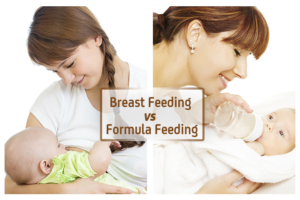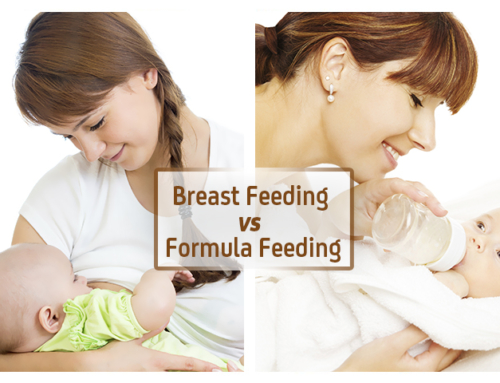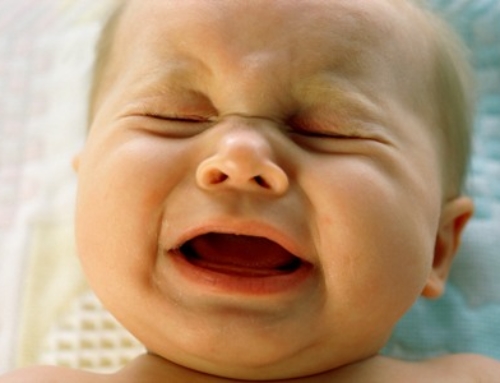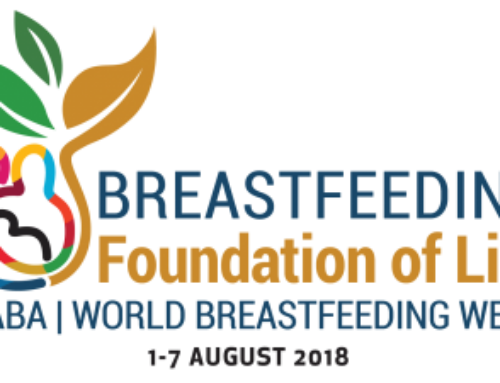
Source: MomJunction
New breastfeeding news is making headlines as the lead researcher and journalists claim that breastfeeding expectations are causing depression in women. The research comes from the Murdoch Institute in Australia (the same institute known for giving us all that pro-CIO research too) and claims to show that the pressure to breastfeed is resulting in greater depression in women
But does it?
We have long known that there is an inverse relationship between breastfeeding and post-partum depression with an intricate web of factors that influence this relationship (for reviews, see [2][3]). For example, we now know that prenatal depression plays a role in the early cessation of breastfeeding, but not the intention to breastfeed[4]. We also know that breastfeeding has been found to decrease the risk of post-partum depression with early cessation linked to increased risk of depression[4][5]. Finally, we also know that early cessation of breastfeeding can be the result of depression, and is not always the other way around[6].
This new research seems to want to throw all of this on its head. Which is great and intriguing if this is what they have actually found. After all, cultural attitudes can shift and result in findings that wouldn’t have made sense previously. (Of course, these other studies are also all recent so at the very least we would have conflicting findings to contend with.) The authors begin justifying the research by claiming that the previous work on breastfeeding duration and depression is “ambiguous”. I would like to point out that there is virtually nothing ambiguous about it and the researchers do not provide any evidence of it being ambiguous. Indeed, each study they cite reports a relationship between depression and shorter breastfeeding duration. What remains unclear, however, is why.
The study recruited 1258 pregnant women with a gestation of <24 weeks during the years of 2003-2005. At this baseline, basic demographic data was collected as was a depression baseline using the Edinburgh Postnatal Depression Scale, which although is primarily validated for postnatal depression, has been validated for use in a prenatal sample as well. At three months postpartum, the depression scale as given again and at six months postpartum breastfeeding data was collected. Breastfeeding data included ‘ever breastfed’, ‘still breastfeeding’, and ‘age of cessation of breastfeeding’ variables. Please note now that at no point do we have any information on why breastfeeding ended, breastfeeding desires prenatally or postnatally, or anything to do with breastfeeding pressure.
 Around 95% of women initiated breastfeeding (and these women are who are included herein for a total of 1176 women), but only 76% of them were breastfeeding at all at three months and 60% at six months. At three months, 6.5% of the women reported depression symptoms above the cutoff. The only demographic variable linked to depression at three months was whether or not the woman was employed or studying in early pregnancy, with those reporting “no” having a 94% increased risk of depression at three months.
Around 95% of women initiated breastfeeding (and these women are who are included herein for a total of 1176 women), but only 76% of them were breastfeeding at all at three months and 60% at six months. At three months, 6.5% of the women reported depression symptoms above the cutoff. The only demographic variable linked to depression at three months was whether or not the woman was employed or studying in early pregnancy, with those reporting “no” having a 94% increased risk of depression at three months.
With respect to breastfeeding, depression at three months resulted in an 82% increased risk of not breastfeeding at six months and this was after controlling for country of birth, maternal age, highest education, employment, and smoking status (many of which also independently contributed to not breastfeeding). What was interesting is that the divergence in breastfeeding rates by depression at three months did not occur until the three month period. That is, breastfeeding rates for the two groups were similar for months one and two, but at three months, we see a split in breastfeeding rates. What does this mean? We don’t know. It means that it could be that depression came first, building up in the first three months and then led to the cessation of breastfeeding or that the cessation of breastfeeding increased the risk of postpartum depression. That data fits both narratives.
But what about the claim that the push to breastfeed is harming women’s health? Well, there is absolutely nothing that suggests this. Nada. In fact, I’m not even sure how one would logically argue this given the data at hand, but let us try to walk through this together, looking at the key points of such an argument:
- If breastfeeding pressure is resulting in postpartum depression then we would expect to see large rates of depression in the early months because this is when the “pressure” would be strongest. This data does not provide any information on depression in months one and two, only breastfeeding rates which are similar between the group that eventually reports depression and the group that does not.
- If breastfeeding pressure results in postpartum depression then we might expect to see either women breastfeeding and reporting not enjoying it and thus suffering or ceasing to breastfeed and reporting a relief of depressive symptoms. There is no data on any maternal report for reasons for stopping breastfeeding or any other factor to do with infant feeding either prenatally or postnatally. There is also no comparison of depressive symptoms across time with which to make a comparison.
- If breastfeeding pressure results in postpartum depression then we might expect to see greater depression with the cessation of breastfeeding for the failure to meet the societal goal of breastfeeding. Again, we have no comparison of depressive symptoms across time with which to make a comparison.
In fact, with the data herein which shows similar breastfeeding patterns for two months followed by an assessment of depression which correlated with a change in breastfeeding rates and then subsequent continued changes in breastfeeding rates, we are hard-pressed to make a pressure argument. Especially when we look at this data in the context of the data that came before it. For example, the findings that the cessation of breastfeeding results in a large increase in the risk of depression and anxiety could fit with the data nicely in that the cessation of breastfeeding may have come between months two and three to lead to this increased risk of depression at month three. The data could also fit with the narrative that depression predicts the cessation of breastfeeding, especially if earlier measures of depression existed that found depression at one or two months predicted the breastfeeding change at three months. What it doesn’t speak to is anything to do with breastfeeding pressure.
Perhaps most importantly, the jump to “breastfeeding pressure” ignores the reality that there are tons of systemic issues that affect women’s ability to breastfeed and why so many women report not meeting their goals[7]. By trying to turn this into an issue of infant feeding choices not being respected, the authors clearly state their own political agenda as they have nothing in the research that would back up their claims. Further, making these statements then ignores that often what is being perceived as “pressure” is really a push to get women the support they need, regardless of feeding method. At the end, what we end up with if we follow this path is a society in which formula feeding is passively pushed because the support for breastfeeding isn’t there, but neither is there support for formula feeding because no one wants to seem as if they are actively pushing it. It’s a lose-lose situation.
I do believe it’s important to understand that researchers continue to examine the very convoluted relationship between breastfeeding and postpartum depression and there may be a role for breastfeeding pressure for a certain subset of women (and identifying them is important); for a larger subset, we know there are real barriers to breastfeeding which can lead to women not reaching their goals and being at higher risk of post-partum depression. Clearly there are many, many factors that are at play here and no one study will likely be able to tell us everything. The problem we have with this study is not that it doesn’t add to the literature in any way, but the researchers are making claims that they don’t even have data to examine, much less support. When this happens it is a disservice to everyone. Breastfeeding is hard and women who want to breastfeed need as much support as they can get and the same goes for women who want to formula feed. What does no one any good is suggesting that the pushes in our society to support breastfeeding mothers who face a host of obstacles is doing harm without any evidence to support that. Let us hope that these misguided comments do not impede progress to helping mothers reach their feeding goals.
——————————————————–
[1] Woolhouse H, James J, Gartland D, McDonald E, Brown SJ. Maternal depressive symptoms at three months postpartum and breastfeeding rates at six months postpartum: implications for primary care in a prospective cohort study of primiparous women in Australia. Women and Birth 2016; in press. [2] Dias CC, Figueiredo B. Breastfeeding and depression: a systematic review of the literature. Journal of Affective Disorders 2015; 171: 142-54. [3] Kendall-Tackett K. Birth interventions, postpartum depression, and breastfeeding. Clinical Lactation 2015; 6: 85-6. [4] Figueiredo B, Canário C, Field T. Breastfeeding is negatively affected by prenatal depression and reduces postpartum depression. Psychological Medicine 2014; 44: 927-36. [5] Ystrom E. Breastfeeding cessation and symptoms of anxiety and depression: a longitudinal cohort study. BMC Pregnancy and Childbirth 2012; 12: 36. [6] Henderson JJ, Evans SF, Straton JAY, Priest SR, Hagan R. Impact of postnatal depression on breastfeeding duration. Birth 2003; 30: 175-80. [7] http://www.cdc.gov/vitalsigns/breastfeeding2015/index.html





Nicely said! Was going to add a link to our recent paper in Women and Birth, but see it cited already
Reading your article more closely I realise you have misread our findings… We are saying no such thing. I recommend that you go back to the paper and relook at both the data and the conclusion…disappointing that you have misunderstood what we are saying and then sensationalised what you think we are saying.
It was in reference to comments made by your colleague to journalists which is what I was replying to. As you said, nothing in the data speaks to this at all, but that was the takeaway message given to the media for it.
I’m sorry you feel I misunderstood and sensationalised it. I would not have taken that from the paper itself, don’t worry, but unfortunately when a researchers speaks out publicly with a view that they tie to their research, it begs a deeper look.
Actually I would agree with the title. In some cases breastfeeding pressure from professionals IS causing PPD because new mums feel they have failed at being a mum if they have any problems breastfeeding (let alone exclusively breastfeeding). Ultimately this comes down to the lack of support early on in order to establish breastfeeding and to try to resolve any issues rather than just top up with formula in hospital. This coupled with the expectation during pregnancy that only exclusive breastfeeding is acceptable.(NHS goals, not necessarily the mother’s although ante-natal classes quickly changes this goal) We all know the benefits and agree that bf is best, IF it’s possible. ( or for some women, they feel bf is not for them and that’s their choice). It is a known fact that some women cannot breastfeed due to medical reasons and apparently this is a low percentage. Then there are the other women who have had problems establishing bf due to, for example, baby being poorly, mother having a medical reason for not being able to begin bf, tongue tie issues being diagnosed too late (late enough to have done damage to a mother’s supply). Yes there are ways that supply can be increased but this simply does not work (enough or quickly enough) for some. This in turn can increase the feeling of failure even further, therefore leading to PPD. PPD would only be diagnosed if the woman went to their midwife/HV/GP and was honest about their feelings. It is almost easier to pretend everything is fine. So in conclusion, yes- the pressure from medical professionals to exclusively breastfeed can lead to PPD if bf does not work out. However not all women suffering with PPD due to bf issues will be aware of it or get it diagnosed. This obviously doesn’t apply to the women who have no issues bf from the get go. Those are the women whose ability to bf exclusively can actually help to prevent them from suffering PPD.
Expectant and new mothers are told repeatedly that if they want the best for their child, they must exclusively breastfeed. Anything less than that indicates that you are failing as a mother and are not providing your child with what they absolutely must have. Women are told that their children will be less healthy, less intelligent, and less emotionally adjusted if they are not exclusively breastfed. The hypothesis that this pressure, combined with the pain of breastfeeding and an even worse lack of sleep that ebf mothers are more likely to experience than mothers who supplement or formula feed, contributes to worse outcomes in terms of PPD, is very reasonable. Mothers should be supported in terms of their health and happiness as well, which may mean more or less breastfeeding, and not only in terms of how well her breasts supply nutrition to an infant.
I found this page as part of some personal research into links between pnd and breastfeeding. I feel very much on the edge of pnd and I need to find some help. I strongly feel this is due to failure at breastfeeding and breastfeeding pressure. I also feel very angry at the expectations around breastfeeding which are practically set for you – i.e. Everyone can breastfeed and only a tiny number can’t. I am positive that I am not the only person to experience this as the internet is filled with similar stories and when I post anything on my social media pages relating to feeling let down by society in relation to breastfeeding pressure I receive many comments from women in the same boat.
From reading your article I’m not convinced you understand what breastfeeding pressure is. It’s easy to assume that this pressure is from Doctors/midwives or maybe from members of the public who don’t want to see breastfeeding in public but breastfeeding pressure is way more insidious and normalised than this.
The language around breastfeeding is filled with pressure. The term breast is best for example blatantly suggests that breast is better than formula, so if you are forced into formula feeding or choose to formula feed you are very conscious that you are offering your child second best. This feeling of offering second best is seriously perpetuated by other mothers, I’ve been told by many mothers particularly on social media that fed isn’t best, its minimum, that formula is processed food like McDonald’s, that formula is sufficient but it won’t ever be best, that I artificially feed my child, that formula is so dangerous it should be in prescription only. The irony is that formula milk is one of the greatest scienctific inventions of modern times and has saved millions of lives and yet now it’s being demonised as poison and yes I’m aware that corporations i.e. nestle have abused formula but this seems have become the main focus of thinking around formula.
Also in terms of language it’s become normalised and expected for breastfeeding mothers to be proud they are breastfeeding, that breastfeeding is an achievement. Is it really an achievement, because after reading around the subject it seems to me that genetics has a lot to do with it and you either can or you can’t. So why is it viewed to be such an achievement. It’s like breastfeeding has become a cult status symbol of the best parent and something to brag about. Surely feeding your baby is a given task for parents and not an achievement?
Breastfeeding has also become a vehicle for mothers to bash other mothers. I’ve been snubbed at baby groups by breastfeeding mothers – in one group three of them turned their back on me mid polite conversation because I pulled a bottle out, I’ve been abused countless times on social media- it seems that it’s acceptable to tell a none breastfeeding mother that she’s selfish, doesn’t care about her baby. One mother actually wrote to me “I adore my baby and want to give him the absolute best of everything….it’s a shame you don’t feel the same” (this isn’t even the worst comment I’ve had). I’ve been reprimanded in supermarkets when buying formula by total strangers.
Also popular culture around breastfeeding implies that all women can breastfeed with a tiny minority (5% allegedly- BS!) who can’t and then grossly exaggerates the benefits of breastfeeding (did you know you can rub breast milk on skin conditions as a cure and it protects against measles too- this is what many mothers actually believe). This results in mothers and society in general persecuting none breastfeeding mothers because it’s “widely known” that nearly all women can breastfeed and all women are aware of the amazing benefits so those who don’t breastfeed are either ignorant or need “educating”.
It seems to me that breastfeeding is being promoted by demonising formula feeding which means that if you feed your baby formula you are always going to be vulnerable to attack and subsequently pnd.
I’m 100% positive this culture is impacting on my mental health and I’m constantly faced with messages of breast is best which keeps highlighting to me my basic failure as a mother. My baby is 5 months old, I stopped expressing at 4 weeks and like many other mothers I’ve been trying to manage these feelings for this length of time without any let up from breastfeeding pressure.
For you to say that the push to breastfeed is not harming women’s mental health is nada is an absolute joke! I suggest you revisit the evidence.